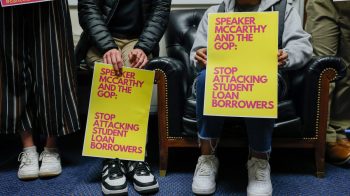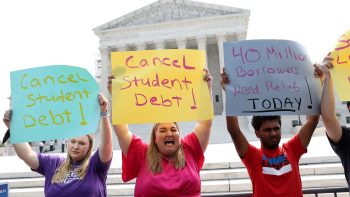
Federal student aid office has a big to-do list in 2023, but the same budget
Federal student aid office has a big to-do list in 2023, but the same budget

The Office of Federal Student Aid has a lot going on right now. Part of the Department of Education, its plans for 2023 include managing the resumption of student debt repayment, simplifying the Free Application for Federal Student Aid and loan forgiveness — if that program withstands challenges in the Supreme Court.
The office asked for more money to help get all that done, but in the new spending law for 2023, its budget remains exactly the same — also known as flat funding.
People who work at the Office of Federal Student Aid already stay up late.
“It’s not uncommon for them to have meetings at 10 o’clock at night,” said Betsy Mayotte, president of the Institute of Student Loan Advisors.
She’s been to some of those late-night meetings. “There’s so many really enormous projects in the air that have very limited timelines to get done, and they’re under a lot of pressure to get those done,” Mayotte said.
Like student loan forgiveness. In late February, the Supreme Court will hear challenges to the policy, and the outcome will determine whether tens of millions of borrowers have their debts forgiven. Even if loan forgiveness doesn’t happen, just resuming student loan collection this year after it was paused due to COVID will be a project.
“The student loan servicing machine was always a very creaky machine,” said Matthew Chingos, vice president for education data and policy at the Urban Institute. “They spun this whole system down, they turned it off in March of 2020 at the start of the pandemic, and now they’re going to have to start it up again.”
A flat budget means that machine could get even creakier.
“Servicing is like any other activity. You know, you get what you pay for,” said Scott Buchanan, executive director of the Student Loan Servicing Alliance, a trade association.
And with budget limits, there’s less room for error — let alone improvements.
“All of the things that everyone’s looking at in terms of quicker processing time, system upgrades, more live agents on the phone — those things all cost more,” Buchanan said.
Meanwhile, borrowers have been out of touch during the pandemic, which can make managing payments even harder.
“Maybe they changed their email address or their phone number, and their servicer in the Department of Education doesn’t even have a way to get in contact with them,” said the Urban Institute’s Chingos.
That means some people might not realize they owe and could be more likely to default.
“These programs should just work,” said Jared Bass, senior director for higher education at the Center for American Progress. “You know, I think when we all take out loans to go to college, we expect to be able to pay them back.”
The Department of Education said in a statement that it’ll do everything it can — with the resources available.
There’s a lot happening in the world. Through it all, Marketplace is here for you.
You rely on Marketplace to break down the world’s events and tell you how it affects you in a fact-based, approachable way. We rely on your financial support to keep making that possible.
Your donation today powers the independent journalism that you rely on. For just $5/month, you can help sustain Marketplace so we can keep reporting on the things that matter to you.

















